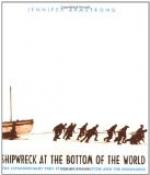“Quickly, boatswain,” said the Captain, “order the Chinaman to make a raft from the beams of the boat, and to arm themselves as best they can. We must force a landing and get some drinking water or we are lost. It we only had half a dozen guns and some ammunition.—Just listen to the cries of these men whom they are putting to death,” said the Captain, turning his eyes away from the sickening sight. [1]
By means of signs the boatswain tried to incite the Chinamen to action. They understood perfectly well what was wanted but remained passive, for Lihoa reminded them of the warning of the God of the Golden Fish not to engage in any strife.
“Leave the cowards to their fate,” said Gray. “We’ll take the single cask of water, the salted meat and hardtack which we fished out of the sea and get out of here tonight secretly.”
The sailors to a man agreed to this plan, but as the boat would hold only six persons the thing could not be managed. The Captain offered to remain, and asked who was willing to stay with him. The helmsman was the only one to signify his willingness to stay; the rest preferred to settle the matter by drawing lots. According to this Redfox and Gray were to remain, so the Captain appointed Green to direct the boat to Australia.
“Green, you are the only man equal to the task, and I give my nephew into your keeping. The boy’s life must be saved. The dangers which threaten you on this perilous trip are scarcely less than those which we face here. Perhaps on some neighboring island you can get drinking-water, perhaps you will fall in with some ship which will come to our rescue. If we are here a month, yes, a week, even, without drinking-water, what then? But as God wills. For my part I will willingly offer my life as a sacrifice in atonement for the past. May the best of fortune favor you, and may you save the life of my nephew. The insurance on this boat all goes to him; and if you rescue him, send him to Father Somazzo in Hongkong. If you cannot save us, come back and see that our bones receive decent Christian burial.”
Thus spoke the Captain. The helmsman, who would willingly have stayed behind on the dreary reef, made ready for the trip and at midnight set sail with the ebb of the tide.
[1] Note.—What is told here and in the following chapter concerning the cannibals happened at the time that the “St. Paul” was wrecked on the Island of Rossel in July, 1858. Compare this account with the one found in Jos. Spillmann’s story, called “Over the South Sea.”
CHAPTER XII.
At Last.




